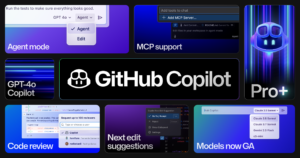Microsoft Unveils New Agentic AI Tools for Enhanced Security Copilot

Microsoft Unveils New AI Tools for Enhanced Cybersecurity
Introduction of Autonomous Agents
Microsoft has taken a significant step forward in cybersecurity by expanding its AI-powered platform, Microsoft Security Copilot. The latest update includes a variety of autonomous agents designed to help organizations tackle the increasing threats in the digital landscape and manage the complexities that come with cloud and AI technologies.
Enhancements to Microsoft Security Copilot
Originally launched a year ago, Microsoft Security Copilot has now integrated 11 new AI agents that automate critical functions such as phishing detection, data protection, vulnerability management, and threat analysis. This enhancement highlights Microsoft’s commitment to utilizing AI as both a protective measure and a proactive defense mechanism against sophisticated cyber threats.
Growing Cyber Threats
According to Vasu Jakkal, Corporate Vice President of Microsoft’s Security Group, the urgency for agent-based AI in security is apparent. In a recent blog post, he noted, "With over 30 billion phishing emails detected in 2024 and cyber attacks now surpassing the capacity for human response, agentic AI security has become essential."
Contributions from Security Partners
Six of the newly integrated AI agents were developed within Microsoft, while five were created in partnership with leading security firms, including OneTrust, Aviatrix, and Tanium. This collaborative approach aims to enhance the tools available for organizations and will see the new features rolling out in preview mode starting April 2025.
Privacy and Regulatory Compliance
Blake Brannon, Chief Product and Strategy Officer at OneTrust, expressed excitement about the developments, stating, "An agentic approach to privacy will be game-changing for the industry." The benefits of these autonomous AI agents include the ability to help privacy teams navigate complex regulatory requirements more efficiently than traditional methods.
Features of the New AI Agents
Among the notable additions is the Phishing Triage Agent, which filters and prioritizes phishing alerts while providing context and adapting through user feedback. Another key tool, the Conditional Access Optimization Agent, actively monitors identity systems for policy gaps and suggests remedies. Additionally, an AI-powered Threat Intelligence Briefing Agent will curate relevant threat insights specific to each organization’s unique risk profile.
Addressing Shadow AI and Security Incidents
The announcement also comes at a time when unauthorized AI use—referred to as "shadow AI"—is increasing. Microsoft reported that 57% of organizations have experienced a rise in security incidents attributed to AI misuse. Alarmingly, 60% of those organizations admitted to lacking sufficient controls to manage these risks.
Expanding AI Security Management Across Platforms
To combat the challenges posed by shadow AI, Microsoft is broadening its AI security posture management to encompass multiple cloud environments. Beginning in May 2025, Microsoft Defender will offer AI security visibility across major platforms like Azure, AWS, and Google Cloud, accommodating various AI models such as OpenAI’s GPT and Meta’s Llama.
New Safeguards for Data Protection
In addition to these innovations, Microsoft is introducing browser-based data loss prevention (DLP) tools aimed at preventing sensitive information from being input into generative AI applications like ChatGPT and Google Gemini. Enhanced phishing protection measures will also be implemented in Microsoft Teams, a platform that has frequently been targeted by email-style attacks.
A Shift in Cybersecurity Landscape
Alexander Stojanovic, Vice President of Microsoft Security AI Applied Research, emphasized that while the rise of AI has introduced new cyber risks, it also presents opportunities. He stated, "The rise of AI has introduced new cyber risk vectors, but it’s also our greatest ally," indicating that this is only the beginning of what can be achieved through the deployment of security agents powered by AI.
To delve deeper into the specifics, check out the Microsoft blog post.






